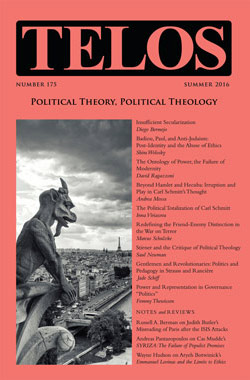“The human receives a particular historical consciousness from his ‘space,’ which is subjected to great historical transformations. The variegated forms of life correspond to equally differentiated spaces. Even within the same time period, the environment of individual humans for the practice of daily life is already defined differently by their different life occupations. An urbanite thinks the world otherwise than does a peasant farmer, a whale-fish hunter has another living space than an opera singer, and to a pilot the world and life appear otherwise not only in other lights but also in other quantities, depths, and horizons.”
—Carl Schmitt, Land and Sea: A World-Historical Meditation
|
“The human is a land-being, a land-dweller. He stands and walks and moves upon the firmly grounded earth. This is his standpoint and his soil; through it he receives his viewpoint; this defines his impressions and his way of seeing the world. He receives not only his field of vision but also the form of his gait and his movements, his shape as a living being born and moving upon the earth.” While “the political” is among the most studied aspects of Carl Schmitt’s thought, little attention has been paid to the notion of “the unpolitical,” which, I argue, plays a crucial role in understanding the totalizing status of the political. This essay, first, illuminates the symptomology of Schmitt’s political totalization; it shows how, despite its claim to autonomy, the political emerges as the total: an infinite potential that consumes human life as a whole. Second, this essay argues that the institution of political totality essentially relies upon the elimination of its radical outside—the “absolutely unpolitical.” Throughout his writings Schmitt presents the unpolitical as a merely “fictitious” reality. Meanwhile, what remains obscured is an originary event, the decision on the absolutely unpolitical, which institutes a pre-political field and thus grounds any subsequent political decision. When Carl Schmitt declared in Politische Theologie (1922) that “All significant concepts of the modern theory of the state are secularized theological concepts,” one could be forgiven for thinking he was directly invoking Max Stirner, who, in Der Einzige und sein Eigenthum (1845), launched a devastating assault on the religious categories that haunted modern thought and politics. While Schmitt and Stirner are approaching the question from opposed perspectives, they are nevertheless engaged in an investigation of the relationship between theology and politics. This article shows how Stirner’s unmasking of the Christianizing impulse behind modern secular humanism—particularly that of Ludwig Feuerbach—and his critique of liberalism, leads us to a radically atheistic politics in which the sovereignty of the state and its accompanying figure of the liberal individual, are deconstructed. Central here is the notion of the insurrection as a revolt against “fixed ideas” and their hold over us. Through his figures of the unique one, ownness, and insurrection, Stirner provides us with an alternative, non-theological language for subjectivity and politics that avoids the chain of substitutions underpinning the theological drive of modern secularism. Those who read Hamlet or Hecuba from the specialist’s standpoint have often found it naïve, and maybe with good reason. Yet I do not want to linger on its worth or faults as a critical essay; I would rather try to read Schmitt’s book in the same way that he read Hamlet, as an eccentric writing, not completely closed, that deals with a subject matter but revolves around another one: Hamlet or Hecuba is something more than a piece of literary criticism. |
||||
|
Telos Press Publishing · PO Box 811 · Candor, NY 13743 · Phone: 212-228-6479 Privacy Policy · Data Protection Copyright © 2025 Telos Press Publishing · All Rights Reserved |
||||



